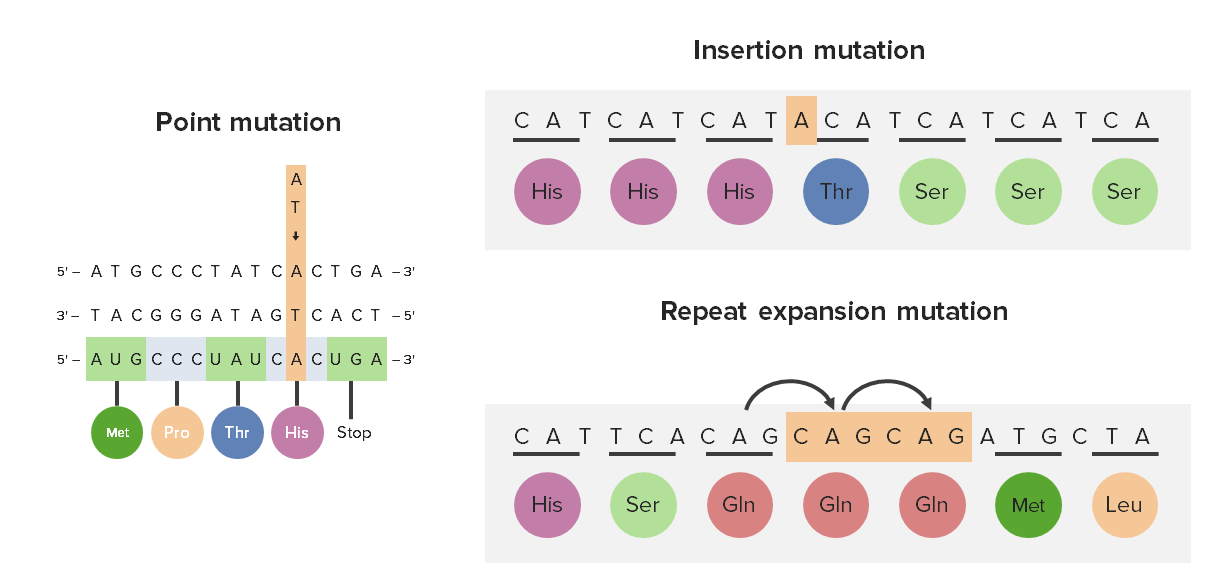Playlist
Show Playlist
Hide Playlist
Cancer Genetics
-
Slides 02 Genetics of Cancer PopulationGenetics.pdf
-
Download Lecture Overview
00:01 Although cancer is not necessarily heritable, on occasion it is. It is certainly a genetic disorder. 00:11 Let’s take a look into the root of cancer. You’re probably all quite familiar already with the progression and metastasis of cancer from physiology. But what sorts of things do result in cancer? We know that they are mutations of genes. But let’s ask ourselves the question, what kind of genes end up resulting in cancer? Think about that for just a moment. First of all, it would certainly have to be genes. You probably recall talking about p53 and genes like that in cell cycle controls. 00:50 So, any gene that has anything to do with cell cycle control, cell proliferation, or even cell death because if cell death goes awry then clearly we’re having cells around when they shouldn’t be around. 01:04 Usually, they might be around or they should have been gone through apoptosis because they have some damage to them. Although very few cancers are heritable, they are certainly genetic but most arise from sporadic mutations. Those mutations generally occur in the somatic cells. 01:28 For a cancer to be heritable, that mutation has to occur in a germline cell. That’s much more rare than say, regular cancer cells of the somatic kind. In any tumor though, one thing that we probably don’t think about too often, we’re taught so often that the cells are all alike and sort of undefined, but the truth is the cells of a cancer are all fairly heterogeneous. Once one mutation occurs which initiates the cancer then many other mutations will follow, such that the cells are much more heterogeneous in a tumor than we may have previously thought. We break these mutations into two types of mutations. On one hand, we have the passenger mutations or passenger genes. 02:21 These are the ones that seemed to be affected after the initial cancer has developed, whereas the other class that we’re really interested in are these driver genes. They’re the ones that are in control of the whole initial mutation. The passenger genes will happen as a result of these driver gene mutations. They are involved in the disease progression itself. Again, we ask ourselves, what kind of mutations are these driver genes? Pretty much anything you can associate with cell proliferation and cell cycle control and apoptosis are potential targets. Why don’t you for just one moment pause and write down all the things that you think or you might remember that are involved in cell cycle controls, apoptosis, and cell proliferation, cell growth. Take a moment. 03:24 Write those things down. Then let’s visit and see if you have a pretty complete list. Naturally, I’m sure you took into consideration the cell cycle and all of these checkpoints. Cell cycle control checkpoints, you’ll recall the majority of them involve a cyclin and a CDK4 pairing. We have a variety of different pairings at all three of these checkpoints. The M checkpoint, before we go into mitosis or meiosis, should it be a germline cell. The G1 checkpoint, we want to make sure that the cell is prepared and ready to go into DNA synthesis. We have a checkpoint at the end of synthesis also. I’m sure that you came to the conclusion that some of these genes are involved in cell cycle controls. 04:19 Now, in cell biology and molecular genetics, we definitely went into quite a lot of detail on each of these checkpoints involving a pairing of a cyclin and a CDK, right? Each of these different pairings will signal the cell to go into the next stage of division. Each of these proteins are coded for by genes on the DNA. 04:39 We have various checkpoints throughout the cell cycle at which any mutation could cause some kind of issue in cell cycle controls resulting in uncontrolled cell division. Cancer is uncontrolled cell division, right? So, anything that lends itself to that. Here’s a quick summary of all of the different mutations. Again, we have a very busy table of information which you could certainly print out and take a more detailed look at. The point here is not to go through the details of each of these mutations. We’ve covered the mechanisms of some before, again in the molecular course. But just to sort of cap over all the sorts of mutations that could happen, so anything involved in cell cycle regulation, right? Here are all these different checkpoints that we could consider, all the different proteins, receptor tyrosine kinases, and growth factors, and G proteins and anything involved in any of those protein cascades involved in the cell cycle and cell proliferation. Cell differentiation, any of the factors involved in those, transcription factors that will determine certain cell lineages as well as any genes that control apoptosis, so anything that is regulating when a cell dies. Remember that there are gatekeeper genes and caretaker genes that will check the DNA and send signals of whether that cell is healthy to move on to a next generation or whether that cell should be destroyed and not allowed to proliferate. Any of these points in cell development and life could lead to a cancer if there is a mutation and anyone of the proteins. 06:31 You can imagine there are literally thousands if not tens of thousands of possibilities in cell cycle controls for things to go wrong. Another area of mutations that we need to consider in controlling cell cycle are DNA integrity and the rates of gene expression. First of all, genome and all the sorts of proteins that are involved in the genome integrity as well as those involved in the rates and regulation of gene expression. Finally, all these epigenetic factors, what things are involved, what proteins are involved in assuring that we get the right DNA methylation in the right place and how do these regulate the gas and brake pedals of cell division or cell cycle controls. Anyway, a number of different areas, again lots of details in the table. 07:31 You don’t need to sort of memorize all of these things. Just have a general understanding of all the sorts of mutations that could lead to broken cell cycle controls because inevitably that’s what cancer is, right?
About the Lecture
The lecture Cancer Genetics by Georgina Cornwall, PhD is from the course Population Genetics.
Included Quiz Questions
Which of the following statements is TRUE regarding passenger mutations and driver mutations?
- Passenger mutations are not the cause of the initiation or progression of cancer.
- Driver mutations do not directly cause cancer initiation and progression.
- Passenger mutations may directly drive cancer initiation and progression in some types of cancer.
- Passenger mutations typically happen less frequently than driver mutations.
- Driver mutations are typically missense mutations.
Which of the following is TRUE of cancer cells?
- The cells of a tumor tend to be heterogeneous.
- Most cancers are heritable.
- Cancer cells do not need driver genes to progress.
- Most cancerous mutations are silent mutations.
- Mutations in genes that affect the G1 checkpoint of the cell cycle cannot lead to cancer.
Which of the following cyclins plays a key role at the initiation of the cell cycle?
- Cyclin D CDK4
- Cyclin A CDK2
- Cyclin B CDK1
- Cyclin C CDK2
- Cyclin E CDK2
Which of the following cyclins plays a key role in the DNA synthesis phase of the cell cycle?
- Cyclin A CDK2
- Cyclin B CDK1
- Cyclin C CDK2
- Cyclin D CDK2
- Cyclin E CDK4
Customer reviews
5,0 of 5 stars
| 5 Stars |
|
5 |
| 4 Stars |
|
0 |
| 3 Stars |
|
0 |
| 2 Stars |
|
0 |
| 1 Star |
|
0 |




